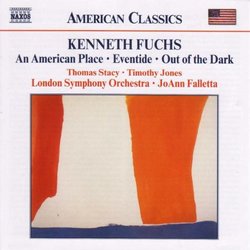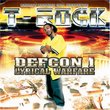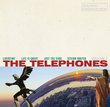| All Artists: Kenneth Fuchs, Thomas Stacy, Timothy Jones, JoAnn Falletta, London Symphony Orchestra Title: An American Place/Eventide/Out of the Dark Members Wishing: 1 Total Copies: 0 Label: Naxos American Original Release Date: 1/1/2005 Re-Release Date: 8/16/2005 Genre: Classical Styles: Chamber Music, Forms & Genres, Concertos, Instruments, Reeds & Winds, Symphonies Number of Discs: 1 SwapaCD Credits: 1 UPC: 636943922422 |
Search - Kenneth Fuchs, Thomas Stacy, Timothy Jones :: An American Place/Eventide/Out of the Dark
 | Kenneth Fuchs, Thomas Stacy, Timothy Jones An American Place/Eventide/Out of the Dark Genre: Classical
|
Larger Image |
CD DetailsSimilar CDs
|
CD ReviewsA Composer Who Should Be Better Known J Scott Morrison | Middlebury VT, USA | 08/18/2005 (5 out of 5 stars) ""A composer who is able to evoke joy, tenderness, humor, wildness, and a sense of the tragic coherently within the same work does many of us a great service: he reminds those of us who love music why we continue to embrace it as an integral part of our lives." -- Composer Richard Danielpour on the music of Kenneth Fuchs About four years ago I came across a CD of three string quartets (Nos. 2, 3 & 4) of a composer I'd never heard of, Kenneth Fuchs. I was blown away and wrote a rave review here at Amazon. I learned that he was the director of the School of Music at my own alma mater, the University of Oklahoma, and contacted him by e-mail. [He has just recently taken a similar position at the University of Connecticut.] We corresponded and then almost two years ago he wrote to tell me that he would have a CD of orchestral music coming out on Naxos in 2005. Several months ago he sent me a preview copy of the CD and, as requested by me, the scores for the three works it contains. I have been happily living with and coming to love these works ever since. I am now thrilled that the CD has finally been released and I can share my enthusiasm again for Ken Fuchs's music. This is a major composer, I'm convinced, whose music is quintessentially American in the same way that the music of Aaron Copland and William Schuman is. The performances here are first-rate, with an old friend of his, JoAnn Falletta, conducting the London Symphony Orchestra. 'An American Place' is the most recent of the works here; it was premièred by JoAnn Falletta and the Virginia Symphony Orchestra in March 2005. Fuchs told me that he was influenced to some degree by the music of American minimalists (and one imagines one hears influences of John Adams and Michael Torke) and wanted to see if he could write in a style that incorporated similar techniques. He certainly succeeded. This is an open-faced, optimistic, even brash piece that makes great use of seventh-chord suspensions, seconds and thirds, whirling strings, skittering winds, pizzicato basses, and brass fanfarade. There is a celebratory atmosphere but there are pauses for suspense, lyricism, melancholy, even tragedy within the work's nineteen minutes. Fuchs wrote it not long after he had moved to Norman, Oklahoma to take up his position at the University there and hoped to evoke a sense of the expansiveness of the prairie. He was also inspired by the Fifteenth Canto of Walt Whitman's 'Song of the Open Road.' ['Allons! The road is before us!...Camerado, I give you my hand!...Will you come travel with me?']. If I had to compare it to any piece that readers might know, I'd suggest they think of the gestures found in Torke's 'Javelin.' This is a marvelous work that will surely find its place in American orchestral concerts, perhaps as a concert opener. It's one of those pieces that makes you feel better. The LSO's performance probably could not be bettered. The English hornist of the New York Philharmonic, Thomas Stacy, one of the legends of that instrument, has been a friend of Ken Fuchs's since their student days (as indeed has JoAnn Falletta) and Fuchs has written several pieces for him. 'Eventide' (a concerto for English horn, harp, percussion and string orchestra) is a twenty-one minute, single movement work that shows what Stacy can do (including some quite lovely multiphonics -- certainly something that takes some doing!) and along the way evokes a nocturnal loveliness that makes me think of the pastoral music of Vaughan Williams without imitating that English master's style per se. There is use made of a melody reminiscent of African-American spirituals but that does not directly quote any of them. Fuchs says he was inspired by such hymns as 'Swing Low, Sweet Chariot' and 'Mary Had a Baby.' The strings, mostly tuned percussion (celesta, crotales, chimes, glockenspiel, xylophone) and harp supply a gossamer cushion upon which the English horn limns a meditative picture of surpassing beauty. The form is that of a set of loose variations. 'Out of the Dark' (Suite for Chamber Orchestra; 16 minutes long) is a set of three tone poems inspired by three paintings of the New York abstract expressionist painter Helen Frankenthaler. Fuchs has been inspired by graphic art before; his Second Quartet was inspired by works of Robert Motherwell. The three paintings, which give their names to the three pieces contained in the suite, are 'Heart of November', 'Out of the Dark', and 'Summer Banner.' (The latter is reproduced beautifully on the cover of the CD's booklet. It would have been nice to have a reproduction of all three of Frankenthaler's paintings in the booklet.) Written in 1984, these pieces are a bit more expressionist (fittingly!) than the later works. There is more bite to them, more astringency but they work their way 'from tension to resolution', to quote Fuchs. Structurally this involves moving more and more into uncomplicated tonality as the set of pieces progresses. This is satisfying both esthetically and emotionally. There is a very important part for solo horn, played here brilliantly by the LSO's principal French horn, Timothy Jones. This is an important issue. Here we have three major pieces by what I am convinced is an important emerging American composer. Strongly recommended. Scott Morrison" Masterful Works by a Talented American Composer M. McDaniel | Colorado Springs, CO USA | 08/20/2005 (5 out of 5 stars) "Like Scott Morrison, I became acquainted with the music of Kenneth Fuchs through his superb string quartets. I've been anxiously waiting to hear more music by this composer, and I'm happy to report that this CD doesn't disappoint. Fuchs is a master of creating music that is lyrical and expressive, yet with underlying structures and harmonics that reward repeated listening. Highly recommended, especially at the budget price!" Grammy-nominated track-:Eventide"! on "An American Place" Ronald E. Bowers | Clearwater, FL | 12/24/2005 (5 out of 5 stars) "This track, "Eventide", shows what the English Horn (in the hands of the great Tom Stacy)-can do. Solo works for this beautiful instrument are hard to find-this CD is a great place to start.
This may be the first time an English Hornist has ever been nominated for a Grammy." |

 Track Listings (5) - Disc #1
Track Listings (5) - Disc #1


